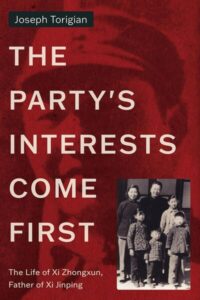Writers have long found it useful to approach the tumult of modern China through the lives of those leaders born around or shortly after the turn of the twentieth century: men whose careers stretched across the subsequent decades of revolution, war, political turmoil and economic transformation. In the last twelve months we have already had two heavyweight biographies of such Chinese leaders—Chen Jian on Zhou Enlai, Robert Suettinger on Hu Yaobang—and now Joseph Torigian has written a similarly substantial account of the life of Xi Zhongxun. Though he never held the highest office, Xi’s life provides a revealing lens through which to view the history of both party and country, as well as the remarkable psychology of persecution and allegiance that marks the stories of the generation of leaders who suffered through the worst excesses of the Mao era.
Xi Zhongxun was born in 1913, just after the fall of the Qing dynasty. By his early teens he had become involved in the Communist cause and at fifteen joined the CCP whilst in prison for having attempted to assassinate an academic administrator at his school on the instructions of the party. He became a founding member of the Communist base area in the Northwest—an essential refuge where the Long March ultimately ended and the CCP leadership, including Mao Zedong, regrouped. Operating in the liminal zones between war and uneasy cooperation with Nationalist forces, Xi learned to navigate the complexities of the United Front. He then took charge of the Northwest bureau, overseeing not only Han regions but also minority areas including Tibet, Xinjiang, and Ningxia. Purged in 1962, at the tail end of the catastrophic Great Leap Forward, he was absent from the political stage during the years of the Cultural Revolution, returning to prominence in the late 1970s to play an important role in the reformist revival of the 1980s.
Had Xi been merely a second-tier party official, subject to awful but not uncommon persecution, his story might still have offered, as Joseph Torigian shows, a revealing account of the Communist Party’s internal workings—a kind of backstage history of revolution, repression, and reform. In particular, Torigian’s account of his life invites the question—one which is ultimately impossible to fully answer for any biographer—why would anyone remain so dedicated to an institution that has treated you so badly? In Xi Zhongxun’s case, the question becomes all the more difficult to answer: the charges levelled against him in 1962 were so slight as to border on the farcical, yet the punishment he and his associates endured was devastating in scale and consequence.
Xi was already politically vulnerable, having narrowly avoided being purged alongside Gao Gang in 1954 and Peng Dehuai in 1959. His eventual downfall came when he was accused of supporting a novel about his mentor Liu Zhidan that allegedly sought to rehabilitate Gao’s reputation and glorify the revolutionary role of the northwest. Though Xi had repeatedly cautioned against the book’s publication, his reluctant approval was seized upon by political rivals, and the affair quickly escalated into a purge involving Mao, Kang Sheng, Deng Xiaoping, and others, ultimately leading to Xi’s purge and the persecution of over 20,000 people (200 people were either killed, driven insane or severely injured). He would spend sixteen years in the political wilderness, and did not see his family for eight years; one of his daughters committed suicide during this period. Yet, this period did not shake his devotion to the party. In the 1990s, Xi would boast that, although Deng Xiaoping had survived periods of exile from the party, he had been persecuted five times. His ordeals did not turn him away from the party, but rather made him ask: how can I gain back the party’s trust?
This is a deeply researched and thoughtfully crafted biography.

Despite the inherent interest of Xi Zhongxun’s life, most will pick up this book because Xi Zhongxun was the father of Xi Jinping, general secretary of the Chinese Communist Party, and the most powerful Chinese leader since Deng Xiaoping. Commentators and historians have often characterised Xi Zhongxun as a relatively reform-minded politician, especially in the context of his later career, when he supported economic experimentation in Guangdong and was allied with Hu Yaobang. This image, alongside Jinping’s own early career, helped shape expectations that his son’s rule might similarly embrace political and economic liberalisation. When Xi Jinping instead pursued a course of assertive nationalism and tightened political control, many observers were left asking: what went wrong?
As Joseph Torigian demonstrates in The Party’s Interests Come First, this liberal image of Xi Zhongxun rests on selective readings and retrospective myth-making. Zhongxun’s views, especially in the Maoist period, were shaped more by loyalty to the Party than by any coherent reformist ideology. Though he occasionally voiced concern over campaigns’s excesses or advocated for cadres’ rehabilitation, he could also be ruthless and changeable, showing tactical flexibility at key moments in his career.
There is, too, a deeper question raised by this father-son relationship regarding Xi Jinping’s own loyalty. Given the suffering inflicted on his family during the Mao years, one might wonder why he would remain so unwaveringly devoted to the institution responsible. But as Torigian suggests, the better question may be the inverse: “How could Jinping betray the party for which his father sacrificed so much?”
This is a biography assembled with scholarly modesty and forensic care, alert as much to what cannot be known as to what can.
This is a deeply researched and thoughtfully crafted biography. Of particular note is Torigian’s careful approach to his material—no detail here is included without careful verification. When relating the story of Xi’s reaction to the ouster of Hu Yaobang in early 1987, he carefully picks apart previous accounts of Xi’s reported anger at Deng Xiaoping, noting that Deng was not at the meeting in which Xi was reported to have lost his temper; Torigian concludes that Xi’s reaction—characteristic of his carefully moderated public reactions throughout his career—was likely much more measured, despite his undoubted sympathy for Hu’s treatment.
For now, we continue to look at the lives of Chinese leaders such as Xi Zhongxun through a glass darkly, but Torigian manages nonetheless to craft a hugely insightful account of both father and son while making his reader fully aware of the contradictions and elisions in the narrative he is tracing. His is a biography assembled with scholarly modesty and forensic care, alert as much to what cannot be known as to what can.


You must be logged in to post a comment.